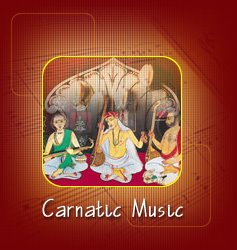
Origins of Carnatic Music
It is thought that Carnatic Music originated from the Vedas (the most important Hindu scriptures), although it is very difficult to pin point a time within history that Carnatic Music began to develop into the form we know today. The Sama-Veda (one of the four volumes of the Holy Scriptures the others being: the Rig-Veda, the Yajur-Veda and the Artharva-Veda) is thought to have laid the foundations for Indian music for it is within this volume that many of the hymns and prayers in the Rig-Veda were set to musical tunes. The seven swara system in Carnatic music is also Vedic in origin.
In line with most other aspects of Indian culture it is also thought that there are many divine origins in Carnatic Music. Carnatic Music is very much associated with Hinduism (the dominant religion in India) with many songs praising a God or Goddess. Some Gods and Goddesses are also linked to certain instruments e.g. Krishna and the flute and Saraswathi and the veena. Many literary epics such as the Mahabharata and the Ramayana also contain references to Carnatic Music. Perhaps most significantly, the Yajnavalkya Smriti (one of the three main Smritis, written by sage Yajnavalkya of Mithila) says:
"Veena vadhana tathvangna sruti, jathi, visartha talanjaaprayasena moksha margam niyachathi"
("The one who is well versed in veena, one who has the knowledge of srutis and one who is adept in tala, attains salvation without doubt.")
Many aspects of Carnatic music are also thought to be derived from Ancient Tamil Music. Pann (the melodic mode which has been used by Tamil people since Ancient times) is thought to be the precursor to the raga system that is found today in Carnatic Music. The rhythmic meters found in Thirupugzh, for example, bear a resemblance to talas that are used today. Tamil works like Silappadikaram, Tolkappiam and other Sangam literature works give old Dravidian names for the seven notes in the octave, and describe how new scales can be developed by the modal shift of tonic (shifting the reference Shadja) from an existing scale.



1 comment:
Dear Karthik,
It is really heart warming that in these days of attractions to other music and busy life you devot time to write such useful episodes. Hats off to you.
Post a Comment